Related Research Articles
A sports game is a video game genre that simulates the practice of sports. Most sports have been recreated with a game, including team sports, track and field, extreme sports and combat sports. Some games emphasize actually playing the sport, whilst others emphasize strategy and sport management. Some, such as Need for Speed, Arch Rivals and Punch-Out!!, satirize the sport for comic effect. This genre has been popular throughout the history of video games and is competitive, just like real-world sports. A number of game series feature the names and characteristics of real teams and players, and are updated annually to reflect real-world changes. Sports genre is one of the oldest genres in gaming history.

Vladimir Alvino Guerrero Sr., is a Dominican former professional baseball player and Hall of Famer, who spent 16 seasons in Major League Baseball (MLB) as a right fielder and designated hitter. He played for the Montreal Expos (1996–2003), Anaheim Angels / Los Angeles Angels of Anaheim (2004–2009), Texas Rangers (2010), and Baltimore Orioles (2011).

EA Sports is a division of Electronic Arts that develops and publishes sports video games. Formerly a marketing gimmick of Electronic Arts, in which they tried to imitate real-life sports networks by calling themselves the "EA Sports Network" (EASN) with pictures or endorsements with real commentators such as John Madden, it soon grew up to become a sub-label on its own, releasing game series such as FIFA, NHL, NBA Live and Madden NFL.

Don Edward Baylor was an American professional baseball player and manager. During his 19 seasons in Major League Baseball (MLB), Baylor was a power hitter known for standing very close to home plate and was a first baseman, left fielder, and designated hitter. He played for six different American League (AL) teams, primarily the Baltimore Orioles and California Angels, but he also played for the Oakland Athletics, New York Yankees, Minnesota Twins, and Boston Red Sox. In 1979, Baylor was an All-Star and won the AL Most Valuable Player Award. He won three Silver Slugger Awards, the Roberto Clemente Award, and was a member of the 1987 World Series champion Minnesota Twins.
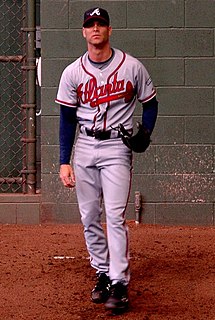
Timothy Adam Hudson is an American former professional baseball pitcher of Major League Baseball (MLB). After spending his college years at Chattahoochee Valley Community College and Auburn University, Hudson played in the major leagues for the Oakland Athletics (1999–2004), the Atlanta Braves (2005–13) and the San Francisco Giants (2014–15). With the Giants, he won the 2014 World Series over the Kansas City Royals.

R.B.I. Baseball is a baseball video game series. R.B.I. is an initialism for "run batted in". Initially launched in 1987, the series initially ran through 1995. In 2014, the series was rebooted as a competitor to MLB: The Show, with releases each year since.

MVP Baseball 2005 is a baseball video game developed and published by Electronic Arts. It features then-Boston Red Sox left fielder Manny Ramirez on its cover. The game features full Major League Baseball, Minor League Baseball, and Major League Baseball Players Association licenses. It holds the 98th spot on IGN's reader's choice top 100 games ever as of 2006. As with previous versions of the game, the announcers are Duane Kuiper and Mike Krukow, real-life announcers for the San Francisco Giants.
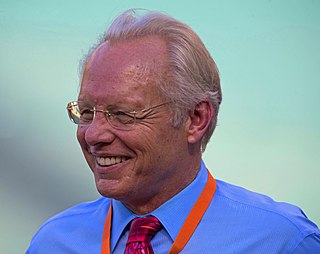
Gary F. Thorne is an American sports executive. He is the lead play-by-play announcer for MASN. He has also worked for ESPN and ABC, including National Hockey League, Major League Baseball, college football, and the Frozen Four hockey tournament. He also works for World Wrestling Entertainment (WWE), where he is the narrator for the WrestleMania Rewind program on its WWE Network streaming video service.

Troy Trevor Tulowitzki, nicknamed "Tulo", is an American former professional baseball shortstop, who played 13 seasons in Major League Baseball (MLB), primarily with the Colorado Rockies. He also played for the Toronto Blue Jays and New York Yankees.

MVP 06: NCAA Baseball is the fourth edition of the baseball video game series developed by Electronic Arts. Because of Electronic Arts' loss of the Major League Baseball (MLB) license to Take Two Interactive in 2005, which now has the exclusive MLB license, the publishers decided to transition the MVP series to feature NCAA baseball, joining the publisher's NCAA football and basketball lines. MVP 06 was released on January 18, 2006 for the Xbox and PlayStation 2 consoles. The athlete on the cover is former Texas Longhorn David Maroul.
MLB 2K was a series of Major League Baseball video games that was developed by Visual Concepts and Kush Games, and published by 2K Sports. There were nine games in the series: 2K5, 2K6, 2K7, 2K8, 2K9, 2K10, 2K11, 2K12 and 2K13. All games were created for each MLB season. The series was created in 2005 after Visual Concepts teamed up with 2K Sports. Visual Concepts called the series World Series and ESPN Major League Baseball in years prior to 2005. In 2014, 2K Games announced that the series had been discontinued, following the release of 2K13.
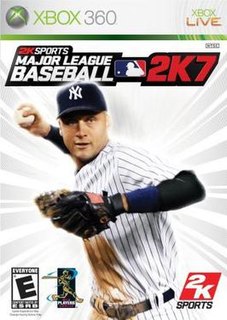
Major League Baseball 2K7 is a Major League Baseball licensed baseball simulation video game developed by Kush Games and published by 2K Sports. Released on February 27, 2007, it is the only 2007 MLB licensed game available for the Xbox 360 and Xbox. It is also available for the PlayStation Portable, the PlayStation 2 and, for the first time, the PlayStation 3, though its competition came in the form of MLB 07: The Show from 989 Sports. Portable versions for the Nintendo DS, PlayStation Portable, and Game Boy Advance were released. It is the first baseball game to be released for the Nintendo DS and the last major release for the Xbox game console.
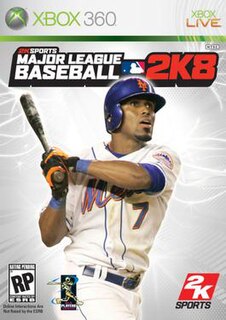
Major League Baseball 2K8, or, in shorter terms, MLB 2K8, is an MLB licensed baseball simulation video game developed by Kush Games and published by 2K Sports for the PlayStation 2, PlayStation 3, PlayStation Portable, Wii, and Xbox 360. It was released on March 4, 2008. A demo was released on Xbox Live Marketplace the next day on March 5 for Canada, United States and Asian markets.
Out of the Park Baseball, abbreviated as OOTP, is a text-based baseball simulation for career, historical, and fictional play. OOTP was originally written in 1998, when lead developer Markus Heinsohn sought to combine realistic replay baseball simulation with career play to satisfy hardcore fans and casual gamers alike. "A friend of mine brought home a bat and a glove from a trip to Miami, so we started hitting tennis balls into the neighbor's gardens. That was in 1991," Heinsohn told Inside Mac Games in a July 2012 interview. "We then formed a baseball club and started playing in organized baseball leagues in 1994. In the meantime I played all sorts of baseball computer games, but there was no management-related game that I liked, so in 1998 I decided to simply develop my own game, just for fun. When it was done in 1999, I figured it was probably good enough to earn some money with it, and that's when it all started."
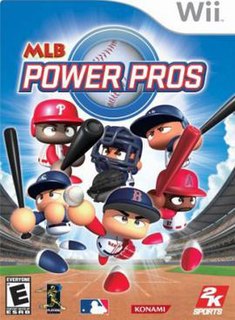
MLB Power Pros is a baseball video game developed by Konami for the Wii and PlayStation 2 video game consoles. It is part of the traditionally Japan-only Power Pros series of video games, and is the first game in the series to be released outside Japan. It was released in October 2007, and is published by 2K Sports. A sequel, MLB Power Pros 2008, came out in 2008. Another sequel, MLB Power Pros 2010, came out on iOS and Android devices in 2010.

Major League Baseball 2K11 or, in short, MLB 2K11, is an MLB licensed baseball simulation video game published by 2K Sports. MLB 2K11 is available for Microsoft Windows, Xbox 360, PlayStation 3, PlayStation 2, PlayStation Portable, Nintendo DS, and Wii.
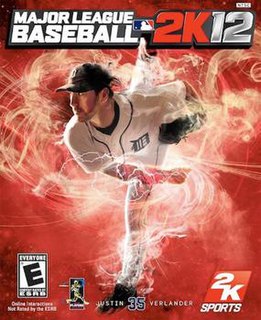
Major League Baseball 2K12 or, in short, MLB 2K12, is a Major League Baseball licensed baseball simulation video game published by 2K Sports that was released for the PlayStation 2, PlayStation 3, PlayStation Portable, Microsoft Windows, Nintendo DS, Wii and Xbox 360 on March 6, 2012. The commentary is delivered by the trio of Steve Phillips, Gary Thorne, and John Kruk.

Major League Baseball 2K5 is an MLB licensed baseball simulation video game published by 2K Sports. MLB 2K5 is available for PlayStation 2 and Xbox. The first edition of the series, powered by ESPN. Unlike the other "2K5" branded sports games, This was published by 2K Sports, making it the first Visual Concepts-developed sports game not to be published by Sega, though Sega's logos are still seen in the background of menus and ballparks. The game included Web Gems instant replays, K-Zone pitching, Slam Zone hitting, and baserunner mode. The game was released in late February 2005 on the PlayStation 2 and Xbox consoles. The cover baseball player was New York Yankees shortstop Derek Jeter. Later that year, an upgraded version titled Major League Baseball 2K5: World Series Edition was released during the 2005 MLB postseason.

A pitch clock is used in college baseball and Minor League Baseball to limit the amount of time a pitcher uses before he throws the ball to the hitter. This is one measure that has accelerated the pace of play.
Pace of play is an issue concerning college baseball and professional baseball regarding the length of games.
References
- ↑ "Triple Play 2002 (PlayStation 2)". IGN.
- ↑ Robinson, Jon (11 March 2003). "MVP Baseball 2003".
- ↑ "MVP Baseball 2003". Metacritic.
- ↑ "MVP Baseball 2003". Metacritic.
- ↑ "MVP Baseball 2004". Metacritic.
- ↑ "All-Star Baseball 2005". Metacritic.
- ↑ "ESPN Major League Baseball". Metacritic.
- ↑ "MVP Baseball 2005". Metacritic.
- ↑ "MVP Baseball 2005". Metacritic.
- ↑ "Major League Baseball 2K5". Metacritic.
- ↑ Nine Years Later, Latin America's Leagues Keep MVP Baseball Alive on Kotaku by Owen Good (12/22/13)
- ↑ Lindbergh, Ben (April 14, 2015). "'MVP Baseball … 2015'? How the Best Baseball Video Game Ever Has Refused to Retire for 10 Years". Grantland.com.
Another factor in MVP’s favor: The game allows greater access to its innards than most titles. [...] 2K’s failure to match MVP’s approval rating despite several years of running unopposed on the PC market, made MVP the go-to game for modders even as it lost its looks relative to 2K and The Show. The community’s support peaked from 2005 through the first PC edition of 2K in 2009, tailed off for a time, and then ramped up again once Take-Two abandoned the PC market in 2013 and canceled 2K entirely last year. A decade of EA development made MVP the best baseball game on the PC market in 2005, and a decade of amateur development has helped it keep that title in 2015.
- ↑ Open-Source-Breathes-New-Life-Into-MVP-Baseball-2005-Video-Game on protecode.com by Sara Purdon (on Sep 15, 2015)
- ↑ Westmoreland, Sam. "NBA 2K11 and The 50 Greatest Sports Games Ever Made".
- ↑ "Archived copy". Archived from the original on 2013-07-13. Retrieved 2013-07-13.CS1 maint: archived copy as title (link)
- ↑ "Now at the Facebook plate: EA Sports' 'World Series Superstars' video game".
- ↑ "Video Games – EA Sports jumping back into baseball? – ESPN". ESPN.com.
- ↑ Sarkar, Samit (21 June 2013). "EA faces barriers to entry for a baseball franchise, says EA Sports chief Andrew Wilson". Polygon.
- ↑ Lindbergh, Ben (14 April 2015). "'MVP Baseball … 2015'? How the Best Baseball Video Game Ever Has Refused to Retire for 10 Years".
